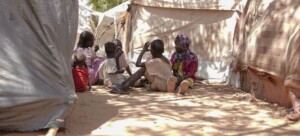Sudan’s cooking gas and bread shortage puts anti-Covid-19 social distancing under pressure
Social distancing as a precaution against the spread of the coronavirus (Covid-19) in Khartoum and Port Sudan is under pressure as long queues from in front of bakeries, fuel stations, and neighbourhood squares due to lack of fuel and cooking gas.
 People queueing for cooking gas in Khartoum this week (Social media)
People queueing for cooking gas in Khartoum this week (Social media)
Social distancing as a precaution against the spread of the coronavirus (Covid-19) in Khartoum and Port Sudan is under pressure as long queues formed in front of bakeries, fuel stations, and neighbourhood squares due to lack of fuel and cooking gas.
The Anti-Coronavirus Operations Room issued decisions to provide basic necessities and limit the spread of the pandemic as the death toll to date reaches 12.
On Monday, the High Committee for Economic Emergencies announced that it would provide all the country’s needs of wheat, diesel, petrol, and cooking gas as well as electricity during this lockdown period.
In a statement on Monday, Omar Manis, Minister of Cabinet Affairs, said that a directive has been issued to authorise the police and other security forces to monitor the flow and movement of goods and other necessities. The new decision aims at preventing any manipulation or hindering activities, especially goods transportation from inside the port to the country and distribution channels.
Manis stated that the Anti-Coronavirus Operations Room issued several decisions such as stopping issuing passes and permits to reduce traffic after the increasing number of coronavirus cases in the country. They also agreed on measures to prevent the petrol stations from supplying vehicle owners except for the vehicles for transportation goods and those operating in the health emergency. Also, they agreed on banning tea vendors’ business, and close down all unessential activities.
PM Abdallah Hamdok stated that the Sudanese platforms to combat coronavirus reflect the concerted public and official effort to face the catastrophe that necessitated resilience hard work. He assured that the Sudanese people will overcome this ordeal and its effects. PM Hamdok further called on the Sudanese to continue their fight against the pandemic.
Hamdok the rapid increase of the coronavirus case means the spread of the pandemic has reached dangerous stages. People must comply with all the ministry of health’s instructions and guidance because this is the only effective way to fight this pandemic.
Port Sudan
In Port Sudan, a severe shortage of flour and bread caused people to break the instructions and guidance of the Ministry of Health, as they lined up in long queues in front of bakeries. The Sudanese Technical Secretariat for Food Security Food Security explained that the spread of the global pandemic will affect the availability of goods and consumption in the country.
On Monday Journalist Osman Hashim told Radio Dabanga that many bakeries closed down due to the lack of flour. In some operating bakeries, people lined up in long lines for hours to get some loaves of bread. “People were indifferent about the social distancing and the instructions of ministry of health, as they line up in front of these bakeries,” Hashim said. He stressed that the authorities must intervene and raise awareness among the people in the state.
The Sudanese Technical Secretariat for Food Security Food Security, Fatima Abdelkarim explained that the spread of the pandemic will affect the availability of goods, the consumption, and some of the most vulnerable parts of the economy regarding supply and demand fluctuations such as transportation, energy, and manufacturing.
“The direct impact will be on the food market because of the shortage of labour if the situation continues,” she emphasised. Fatima warned that the high price of foods and weak purchasing power will negatively affect access to food. “Consumption patterns will shift to lower types and quantities of food, which will increase the country’s malnutrition rates,” she concluded.
Lockdown
The total lockdown in the Sudanese capital of Khartoum that has been in force since Saturday has caused printed newspapers to stop publishing. A shortage of Personal Protection Equipment (PPE) has also prompted many doctors to stay at home for fear of contracting coronavirus (Covid-19) as the death toll climbs to 12.
Sudan’s High Committee for Health Emergencies declared total lockdown for three weeks as of Saturday in the Sudanese capital Khartoum.
During the lockdown, workers in the public and private sectors in Khartoum state will be given a leave of absence for three weeks, except for sectors related to basic needs such as food.
Sudan’s Minister of Information, Culture, and Tourism, Feisal Mohamed Saleh announced that during the lockdown businesses such as pharmacies and supermarkets will be allowed to operate.
The interim governor of Khartoum state, Yousef El Dei, does not rule out that he will gradually reduce the hours allowed for shopping if overcrowding in the residential districts continues. People are restricted to do their shopping in their own neighbourhood from 6 am until 1 pm. The major markets have been closed as well. Public transport has been banned. The lockdown measures will be evaluated in the coming three days, El Dei said.
Radio Dabanga’s editorial independence means that we can continue to provide factual updates about political developments to Sudanese and international actors, educate people about how to avoid outbreaks of infectious diseases, and provide a window to the world for those in all corners of Sudan. Support Radio Dabanga for as little as €2.50, the equivalent of a cup of coffee.












 and then
and then